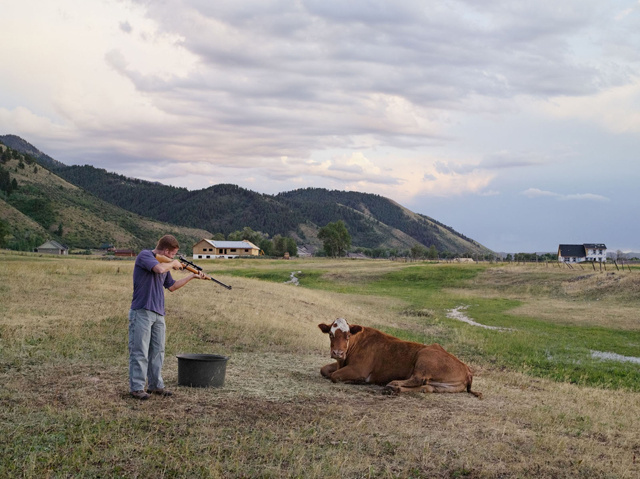Mossless in America is a column featuring interviews with documentary photographers. The series is produced in partnership with Mossless magazine, an experimental photography publication run by Romke Hoogwaerts and Grace Leigh. Romke started Mossless in 2009, as a blog in which he interviewed a different photographer every two days; since 2012 the magazine has produced two print issues, each dealing with a different type of photography. Mossless was featured prominently in the landmark 2012 exhibition Millennium Magazine at the Museum of Modern Art in New York; it is supported by Printed Matter, Inc. Its third issue, a major photographic volume on American documentary photography from the last ten years, titled The United States (2003–2013), will be published this spring.
Advertisement

Adam Killing a Cow, Mortensen Family Farm, Afton, Wyoming 2010Lucas Foglia hails from the once spacious, now suburban farmland of Long Island. In his first series, A Natural Order, Foglia traveled around the southeastern United States and visited communities of people who made the choice to stay away from that development and live, more or less, off the grid. In his newest series Front Country, he traveled out west to some of the United States least populated regions only to find himself right in the middle of a mining boom. Foglia’s work beautifully captures his subjects finding a balance between human nature and the natural world. You order his new book, Frontcountry, published by Nazraeli Press here.Mossless: For your series, A Natural Order, you photographed people who have chosen to live off the grid. What drew you to their communities? Lucas Foglia: I wanted to meet and photograph people who had chosen to leave cities and suburbs to live as self-sufficiently as they could in rural Appalachia. I photographed in the midst of rising oil prices and the economic recession—so many of the people I photographed were inspired by environmental concerns or predictions of societal collapse.Where are you from? I grew up on a farm in Long Island, 30 miles from New York City. My parents still farm but the land around us was sold and developed. So now, there are suburban houses where our neighbors' farms and woods used to be.
Advertisement
Valarie and the Shadow, Tennessee 2008Tell us about the man in the shadow. That's Valarie's father, George. George worked as a nuclear engineer in New Jersey and met his wife, Christina, at a motorcycle rally. Then George started getting worried about the risks of nuclear technology, and he and Christina converted to the Christian Israelite faith. They moved with their children to a farm in rural Tennessee.Does their way of life appeal to you? Will you return?Well, no one I photographed was completely off grid. Everyone chose parts of the mainstream to bring with them: a car, a cell phone, a laptop, and other things like this. Similarly, I like having a camera and a van with a bed in the back. I also like growing food and coming home to a community of friends on the edge of a city. So will I return to the area I photographed in A Natural Order? Sure, to visit.The subjects of that series seem to be living side by side with nature, but in your newest series Frontcountry, the subjects seem to dominate it. Frontcountry is set in the American West, a region that is famous for big skies and open land. I first traveled to Wyoming expecting to photograph cowboys, ghost towns and wilderness. What I encountered was a mining boom. Frontcountry focuses on the ways that two very different lifestyles, ranching and mining, share and depend on the same landscape.Amanda after a Birthday Party, Jackson, Wyoming 2010
Advertisement
In both Frontcountry and A Natural Order I befriended people who chose to live in small communities next to wild land. But in Frontcountry I wanted to show the contrast between agriculture and new development more clearly. Ranching and farming are about heritage, labor connected to land, seasons and weather. Mining is about pulling new money out of the ground, fast. The problem is that every mine closes eventually, and the land is left scarred. Miners have to leave too, following jobs across the country.Do you see this new body of work as being representative of the state of our times?I hope the photographs provoke people to ask questions, and find their own answers.I do think the questions are important ones: What kinds of jobs allow people to live in the contemporary American West? How should we use the wild land we have left?What's next?I'm working on a nature calendar.Lucas Foglia is represented by Fredericks & Freiser Gallery. He studied at Brown University and the Yale School of Art.Follow Mossless magazine on Twitter